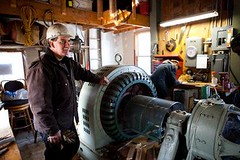
New England mill towns have a long history of tapping into the power of water running downhill. In the Orion Magazine article,
The Poetry of Power, Ginger Strand profiles the resurgence of hydro sites in the area and the role of Verne Tower and others in restoring facilities that have crumbled from neglect.
The tradeoff, of course, is the environmental damage caused by dams--both large and small--and the costs associated with mitigating that damage.
Cost is a highly rational way to make decisions. Big dams may not be ideal, but they’re efficient. Small dams do less harm, but their economic benefits may not outweigh the harm they do. One thing this assumes, of course, is that there’s no relationship between our centralized power grid and our profligate use of power. But it isn’t easy to connect the action of running your microwave to the burning of a hunk of coal two counties away. In the era of Big Energy, power has retreated from the public eye.
People who go off the grid learn to re-see it; when you’re making your own watts, turning on a light or a television has a tangible cost. Heatless Mondays become something to consider. Maybe TV-less Tuesdays too. Recently, when avalanches took out transmission towers that brought hydropower to Juneau, Alaska, the city was forced to run on diesel generators. The price of electricity increased from eleven cents a kilowatt-hour to fifty-three. Within weeks, consumption dropped by 30 percent. But it may not have been just about price. The hydropower plant was nearly thirty miles away; the diesel generators were all within the city limits. And they were dirty. By the time the transmission towers were repaired, the generators had pushed Juneau to the limit of its air-quality permit. Power use was suddenly a cause with effects you could see.
The realities of coping with difficult energy tradeoffs are inescapable as the pressures of global warming force us to rethink the traditional models of power generation. Microgeneration--deriving power from thousands of small sites rather than distributing it from a large site--is a model that has become one of the fastest growing alternative energy options.
Lori Barg, founder of the Vermont Small Hydro Association, commented:
“We’re losing one or two times as much power as we’re using in the end,” Lori says. “If you want to start looking at the economics, is a kilowatt-hour generated in Boston the same as a kilowatt-hour generated in Peterborough, when you have so many losses along the way? It’s like having a leaky bucket.”
A theme runs through the article--reconnecting people to the sources of their power. It's certainly an idea that merits consideration as we look to the sun, wind, and water to meet our power needs.

